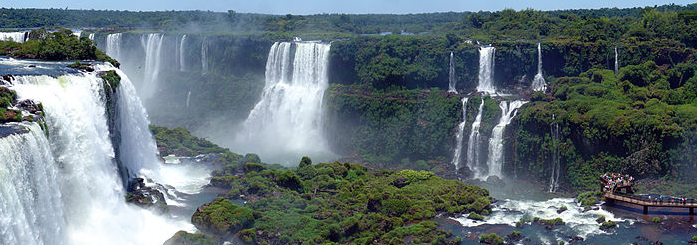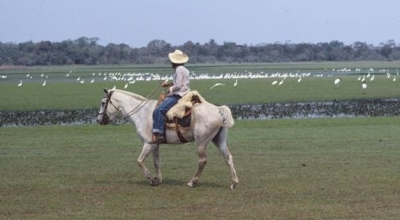HORSE RIDING IN BRAZIL
Brazil is the giant of South America, covering a large landmass and encompassing many diverse areas. Brazil is an alluring country, with dazzling beaches, tropical islands, deep canyons, waterfalls, picturesque towns, ... and a great horseback riding country ! The landscapes are as diverse as the Brazilians ! Each of our horseback riding tours offered has its own appeal and offers superb wildlife viewing opportunities in lands of ecological wonders.

HORSEBACK RIDING IN BRAZIL:
Brazil is the largest country in South America with a beautifully diverse geography and a predominantly tropical climate. The country is home to many spectacular ecosystems such as the Amazon rainforest, which is known to have the greatest biological diversity in the world. It is an exotic country for, with not only its rich wildlife, beautiful landscapes and warm weather, Brazil also has a fascinating culture.
A Portuguese colony from 1500 to 1822, the heart of Brazilian culture is based on certain Portuguese foundations such as language, Roman Catholicism and colonial architectural styles. Many other cultures, like that of European immigrants, also helped shape the traditions of Brazil. Indigenous peoples influenced the traditions of the country, and African influences are also apparent in the language, food, music, religion, and dance styles. Brazilian cuisine offers a variety of regional recipes and delicious sweets, as well as coffee and cachaça, the indigenous liquor used in the delicious Caipirinha cocktails. Brazilian music has many distinct styles, and soccer is the country's most popular sport.
The variety of natural habitats in Brazil is spectacular and much of the land remains virgin. Many natural environments are threatened by the development and preservation of tropical forests and other landscapes have become an environmental concern across the world. Apart from the Amazon rainforest, the Atlantic forest and the Cerrado (a tropical savanna) have such biodiversity. The different environments and the wonderful variety of climates, make this country a captivating place to explore on horseback.
The “Gaucho do Brasil”, the legendary South American cowboy, refuses to break with the tradition that makes the gaucho way of life the most vibrant equestrian culture in the world. The Brazilian Gaucho lives in the southern states of Santa Catarina and Rio Grande do Sul and many descend from Europe when many immigrants arrived in the 18th and 19th centuries, pioneering mainly from Portugal, Spain, Italy, Germany , Austria, Holland and Belgium.
Brazil's national horse is the Mangalarga, a wonderful breed that has since split into two - the Mangalarga (also known as the Mangalarga Paulista) and the Mangalarga Marchador. The original Mangalargas (Paulista) were bred by a baron in the early 1800s, when the topography and cultivation of the land forced him and his family to seek out different horses. He crossed royal horses, a specific breed from Lusitano, with his own colonial mares (mostly beards) to create a horse with beautiful, smooth gaits. He was then crossed with Thoroughbreds, Arabs, American Saddlebreds and a Lusitano to create the Mangalarga Marchador. These two types of horses are excellent for trail riding and a variety of disciplines, although their gaits are slightly different.
The other races native to Brazil are the Campolino and the Pantaneiro.
However, the Criollo (Crioulo in Portuguese) is perhaps the most used by gauchos. The Criollo is a horse native to Brazil, Argentina, Uruguay and Paraguay. Due to its hardiness and endurance, the Criollo may be a better cross-country horse than the Arabian horse for extended week trips.
For the adventurous traveler, Brazil is a spectacular country to visit and offers plenty of horse riding opportunities. There are many activities available besides horseback riding and rainforest adventures - visitors can ride cattle ranches as well as practice dressage and other equestrian disciplines.
WHEN TO GO HORSEBACK RIDING TO BRAZIL:
Brazil is so vast that it is practically impossible to define the ideal season to travel there. Brazil being located in the southern hemisphere, the seasons are reversed compared to Europe.
In southern Brazil: The southern summer extends from December to March. It is very hot, even stifling in Rio and São Paulo. It is not exempt from tropical, sudden and sometimes torrential rains. The southern winter runs from June to September, but temperatures remain pleasant, from 12 ° C at night to 25 ° C during the day. The coast offers an almost Mediterranean climate: mild winter, hot summer.
In the Northeastern States: Bahia and Pernambuco. Close to the equator, the heat, sometimes heavy from December to March, is punctuated by frequent but brief showers. Prefer the period from September to mid-December and from March to June (lower prices also in hotels) to visit this region.
Mato Grosso and Mato Grosso do Sul: These regions also experience, during the austral summer, a rainy season which floods the great plains of the Pantanal. The city of Cuiabá, in Mato Grosso, is known to be one of the hottest in Brazil, with temperatures close to 40 ° C all year round.
Amazonia: A hot, rainy and very humid region. In the forest, the humidity level reaches 100%. There are 2 periods: that of the chuva, which extends, in most of the basin, from January to June (sometimes torrential rains but often of short duration), and that which goes from July to December (the season " dry ”).





